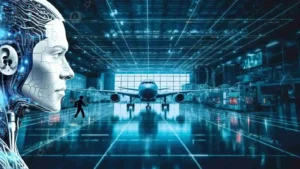The Transformative Role of AI in Aviation
Artificial Intelligence (AI) is revolutionizing numerous industries, and aviation is no exception. From enhancing operational efficiency to improving passenger experience, AI is poised to redefine the future of aviation. This article explores the various applications of AI in aviation, its benefits, challenges, and the future prospects of this technological marvel.
AI in Operational Efficiency
- Predictive Maintenance
- Proactive Repairs: AI algorithms analyze data from aircraft sensors to predict potential component failures before they occur. This proactive approach reduces downtime and maintenance costs, ensuring aircraft are available for operations more frequently.
- Data-Driven Decisions: AI helps in making informed decisions regarding maintenance schedules and part replacements, optimizing the overall maintenance process.
- Flight Operations
- Fuel Efficiency: AI analyzes vast amounts of data, including weather conditions, air traffic, and aircraft performance, to recommend optimal flight routes and speeds. This results in significant fuel savings and reduced emissions.
- Crew Scheduling: AI-driven systems streamline crew scheduling by considering various factors such as flight hours, rest requirements, and operational needs. This ensures compliance with regulations and maximizes crew utilization.
- Air Traffic Management
- Traffic Flow Optimization: AI enhances air traffic management by predicting and managing traffic flow, reducing congestion, and improving safety. Machine learning models can anticipate traffic patterns and suggest efficient routes.
- Collision Avoidance: AI-powered systems assist in detecting potential collisions and providing timely warnings to pilots and air traffic controllers.
AI in Enhancing Passenger Experience
- Personalized Services
- Tailored Recommendations: AI analyzes passenger preferences and travel history to offer personalized recommendations for in-flight services, entertainment, and travel itineraries.
- Chatbots and Virtual Assistants: AI-powered chatbots and virtual assistants provide real-time assistance to passengers, answering queries, and resolving issues quickly and efficiently.
- Smart Airports
- Automated Check-In: AI streamlines the check-in process with facial recognition technology and automated kiosks, reducing wait times and enhancing security.
- Baggage Handling: AI optimizes baggage handling systems, reducing the chances of lost luggage and ensuring timely delivery.
- Safety and Security
- Behavioral Analysis: AI enhances security by analyzing passenger behavior and identifying potential threats. Advanced algorithms can detect suspicious activities and alert security personnel.
- Biometric Screening: AI-driven biometric screening ensures a seamless and secure boarding process, enhancing overall passenger safety.
Challenges in Implementing AI in Aviation
- Data Privacy and Security
- Sensitive Information: The use of AI involves handling vast amounts of sensitive data, including passenger information and aircraft performance data. Ensuring data privacy and protection against cyber threats is paramount.
- Regulatory Compliance: Navigating the complex landscape of regulations governing data usage and privacy is a significant challenge for the aviation industry.
- Integration with Existing Systems
- Legacy Systems: Integrating AI solutions with existing legacy systems in aviation can be complex and costly. Ensuring seamless integration while maintaining operational continuity is crucial.
- Interoperability: Achieving interoperability between various AI systems and aviation technologies is essential for maximizing the benefits of AI.
- Cost and Investment
- High Initial Costs: The initial investment required for developing and implementing AI solutions can be substantial. This includes costs related to technology infrastructure, software development, and personnel training.
- ROI Uncertainty: Measuring the return on investment (ROI) for AI initiatives can be challenging, especially in the initial stages.
The Future of AI in Aviation
- Autonomous Flight
- Pilot Assistance: AI is paving the way for autonomous flight, with systems capable of assisting pilots during complex maneuvers and even taking over in emergency situations.
- Fully Autonomous Aircraft: While fully autonomous passenger aircraft may still be years away, AI is already making significant strides in this direction with autonomous drones and cargo planes.
- Enhanced Decision-Making
- Real-Time Analytics: AI will continue to enhance decision-making processes by providing real-time analytics and insights, enabling more informed and timely decisions.
- Scenario Simulation: Advanced AI systems can simulate various scenarios, helping airlines prepare for potential disruptions and optimize their responses.
- Sustainability
- Emission Reduction: AI will play a critical role in reducing the aviation industry’s carbon footprint by optimizing flight operations, improving fuel efficiency, and supporting the development of sustainable aviation fuels.
- Resource Management: AI-driven resource management systems will help airlines minimize waste and make better use of resources, contributing to overall sustainability goals.
Conclusion
AI is undeniably transforming the aviation industry, offering unprecedented opportunities for enhancing operational efficiency, passenger experience, and safety. While challenges such as data privacy, system integration, and high initial costs exist, the potential benefits far outweigh these hurdles. As AI technology continues to evolve, its role in aviation will only grow, leading to a more efficient, safe, and enjoyable flying experience for all. The future of aviation is bright, with AI at its helm, steering the industry towards new heights of innovation and excellence.


